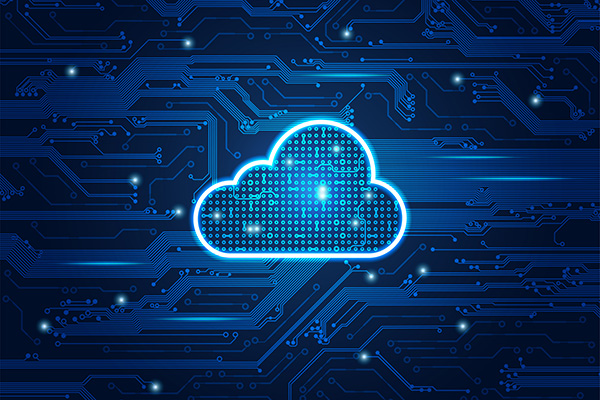Of all the NextGen supply chain technologies, the cloud could be the most important today.
Not only is it already widely used and growing rapidly, but cloud is central to optimizing supply chain performance on a broad scale.
Some say that cloud will be the most impactful NextGen technology in the supply chain for the foreseeable future based entirely on its use as a backbone of data interchanges.
“The use of the cloud has exploded,” explains Tom Ward, cognitive project leader at IBM (see NextGen Supply Chain interview).
“Most information technology growth is on the cloud. Today, we are using artificial intelligence technologies on the cloud to understand, reason, learn and interact with our supply chain data.”
We've all heard of extremely high growth rates in cloud revenue at companies such as Amazon, Google, Microsoft and others. Many go so far as to attribute Amazon's newfound profitability to the profitability of its cloud services. No matter the angle considered, the cloud is proliferating rather quickly.
A recent Goldman Sachs study projects large public firms will increase their cloud use from 18% this year to 34% next year. That Goldman survey also shows cloud as the fourth highest priority for IT departments this year.
Interest in cloud is showing up elsewhere, too. In fact, cloud is the NextGen technology generating the second highest level of interest across multiple departments in a range of companies. That's according to a survey by Nick Vyas, assistant professor at the Marshall School of Business at the University of Southern California.
Clearly, there's something going on here. And from all indications, supply chain applications from the Internet of Things (IoT) to 3-D printing are just as tuned into the cloud as any finance application.
“Real cloud applications are laying the foundation for innovative solutions from IoT to Blockchain,” says Diego Pantaoja-Navajas, vice president of WMS, Fusion SCM development at Oracle.
So, what's the power of the cloud in the supply chain?
To begin, the cloud centralizes data and offers multiple entities access to that data, decreasing costs and speeding supply chain velocity while adding data security. As reported in the Wall Street Journal, Walmart announced a five-year deal with Microsoft to use its cloud services. Why? Walmart wants to share sales and purchasing data with its vendors.
“If you look back three to five years, there was a very limited adoption of technology in procurement,” says Balaji Abbabatulla, research director at Gartner. “But the adoption of technology has accelerated since then. The cloud makes it so easy for procurement people to adopt new technology software applications,“ he adds.
There is another fundamental shift in the supply chain, and elsewhere for that matter, fueling cloud adoption. Quite simply, companies are starting to treat data as an asset. Furthermore, the value of data only increases as it is accessible across enterprises. While most will agree that we aren't there yet, the direction is clear. All of this only bodes well for adoption of cloud, especially in the supply chain.
Quite simply, cloud is becoming a supply chain utility. It is a core capability that enables collaboration both internally and externally. The Walmart story is one example. So is the introduction of artificial intelligence and Internet of Things to supply chain applications. In most cases, it would be impossible for any other network technology to enable the flow of data and necessary sharing of data to make either NextGen technology live up to its potential across the supply chain.
IBM, in particular, talks about running Blockchain on its cloud platform. It even has a name – Project Bletchley. Running blockchain in the cloud, says the company, enables it to run new functions and services not previously possible.
Elsewhere, consider the importance of cloud to something as established as ERP. Companies advocating cloud use here range from Oracle and IFS to Infor and others.
“To begin, hundreds of installations have made it clear that you can run WMS (warehouse management systems) in the cloud,” says Pantoja-Navajas of Oracle.
IFS's senior advisor Jakob Bjorklund explains that his company's software-as-a-service WMS runs completely in the cloud. But rather than running at Amazon or its competitors, this software runs in the IFS managed cloud.
Both the IBM and IFS efforts demonstrate the development of still another approach to cloud for supply chain applications. It doesn't have to involve the big boys of cloud. Instead, companies deep into supply chain applications are developing their own hybrid cloud platforms, still another avenue to put this NextGen technology to work right now.
Which raises the question - what's in your cloud?
Gary Forger is the special projects editor for Supply Chain Management Review. He can be reached at [email protected].
SC
MR


More Cloud
- AI Simulation Takes Its Place Among Supply Chain Forecasting Tools
- 52% of Enterprises Have Moved to the Cloud
- Cloud computing needs installed based planning
- The cloud hovers over fast software supply chains
- Cloud gains favor for supply chain labeling
- 7 business-boosting benefits of cloud labeling solutions
- More Cloud
Latest Podcast

 Explore
Explore
Software & Technology News
- Technology’s role in mending supply chain fragility after recent disruptions
- Tech investments bring revenue increases, survey finds
- Survey reveals strategies for addressing supply chain, logistics labor shortages
- AI, virtual reality is bringing experiential learning into the modern age
- Humanoid robots’ place in an intralogistics smart robot strategy
- Tips for CIOs to overcome technology talent acquisition troubles
- More Software & Technology
Latest Software & Technology Resources

Subscribe

Supply Chain Management Review delivers the best industry content.

Editors’ Picks




